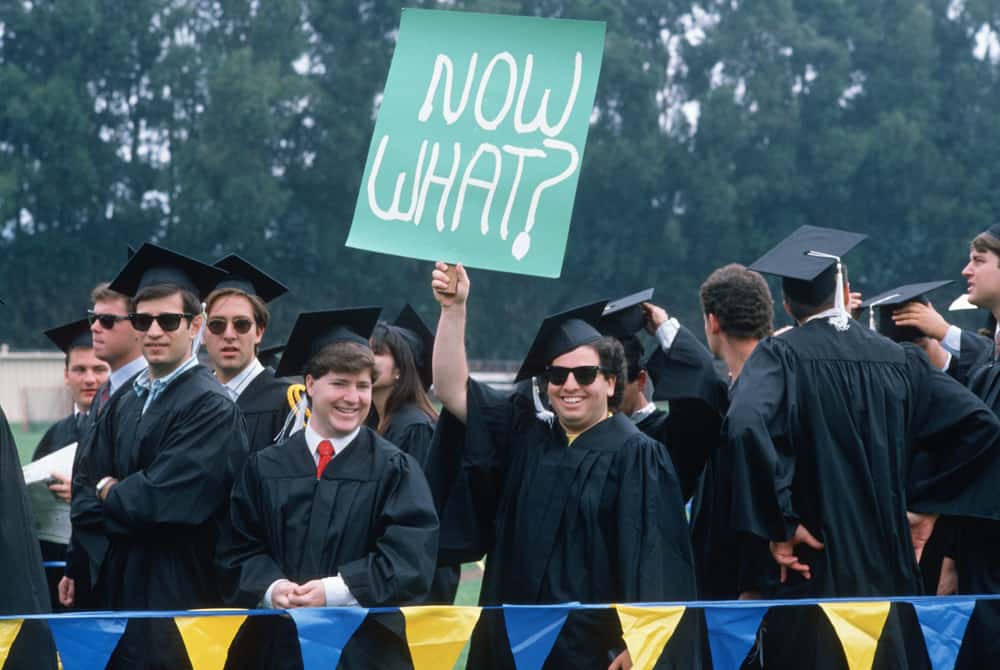
Before spending an obscene amount of money on a bachelor’s degree, families want to know if their children’s job prospects are good.
As I’ve mentioned in past college blog posts, it’s difficult to get a good grasp of this because the employment statistics that schools share are usually meaningless.
Institutional job statistics usually rely on grads returning surveys and few do. And, as you can imagine, the ones that do participate in surveys are the ones who found employment.
You might assume that one logical place to look for a school’s commitment to job preparation is an institution’s career services office. But, here again, the reality can be discouraging.
A couple of weeks ago, I was talking to an executive at a Fortune 500 company who told me that his company doesn’t bother with university Career Services Offices  to find employees. This company that hires many STEM majors, works with professors at certain universities that provides recommendations. This executive was downright condescending when he spoke of career service offices.
to find employees. This company that hires many STEM majors, works with professors at certain universities that provides recommendations. This executive was downright condescending when he spoke of career service offices.
This weekend I was talking to a friend, who is an career expert, who worked for many years at a major flagship university and who is quite familiar with university career placement efforts. She observed that career services offices aren’t much help. For starters, she said the offices are typically understaffed. Schools count on the majority of students not to use their services.
Just as alarming, the people in these career offices, she noted, are often removed from what’s happening in the work world. If you want much more than help with a resume, you could be out of luck
I am mentioning these conversations now because of a new crowd-sourced report issued last month – A Roadmap for Transforming the College-to-Career Experience – that takes a critical look at college career services. The report, which was edited by Andy Chan and Tommy Derry, at Wake Forest University, was the culmination of a conference hosted by Wake Forest that brought together 250 college administrators, professors, corporate executives and thought leaders.
The report summarized the problem with career services in general:
While transformational changes have occurred in the world of work, many college career offices look and
function the same way they did twenty years ago. When we think about how dramatically the world of work has
changed, it is remarkable that the methods utilized to prepare students to enter it have remained static. Yet
instead of investing, schools slashed career office budgets by an average of 16 percent this past year while
prospective students and families pleaded for increased support to help find gainful employment.1 Unless we
can demonstrate to prospective students and their families that the four years spent at college will result in better
employment prospects, there will continue to be those who disparage a college education as a waste of money.
The conference participants agreed, according to the report, that schools must reexamine their existing models and construct new methods to help students successfully enter the world of work. Many ideas were examined, but everyone agreed on one point: schools must reexamine their existing models and construct new methods to help students successfully enter the world of work.
To generate meaningful change, senior administration and faculty must make this a priority. Career office must reach out to influential groups around campus, particularly academic advancement, communications, information system and alumni relations offices.
Why Are Career Service Offices So Lame?
I think a one reason why colleges haven’t made career services a priority is because they have been able to get away with it. Since a way didn’t exist for families to measure how well schools did at helping their grads find jobs, they didn’t have to be accountable. This, however, is thankfully changing.
In a modest first step, the federal government recently unveiled College Reality Check that serves as a mini report card for schools. The U.S. Department of Education eventually hopes to include employment data on the scorecards. Here is my post on this:
Measuring a School’s ROI With College Reality Check
The real action has been on the state level as a growing number of states have set up systems that track and share what average salaries are of young college graduates at specific schools within their states. Even more helpful, you can see salaries for specific majors. The states where you can find this information are Texas, Colorado, Arkansas, Tennessee and Virginia. An easy way to access this information is through CollegeMeasures.org.
Promising Legislation to Make Schools Accountable
Finally, the heat is being applied in Congress to share job data on schools throughout the country. Why roll out salary data one state at a time when the federal government could provide it coast-to-coast?
A bipartisan bill, sponsored by Senators Mark Rubio (R-FL) and Ron Wyden (D-OR) introduced legislation last week that would link individual student records with wage data nationally. The ultimate goal of this legislation is to empower families with information they need to make smart college decisions.
Shamefully, this effort was stymied five years ago when opponents of transparency, including some private colleges and universities and conservative Republicans, convinced Congress to ban the federal government from creating a so-called “federal unit-record database” that would have allowed us to check the overall salaries of grads of any school, as well as the salaries of grads of particular majors.
The resistance to this consumer tool has thankfully been softening. I hope the bipartisan bill passes.
I don’t, by the way, believe that initial salaries tells us everything we need to know about a school and this tool should not be the only one used. I do think transparency is desperately needed because it is the only way to force schools to treat job preparation seriously.
There are too many students with $250,000 educations that are living back home with their parents.
NOTE: Michelle Kretzschmar of Do It Yourself College Rankings and I will hold our second college webinar at 6 p.m. West Coast time on June 17. To attend the webinar, just visit my webinar page at the appointed time.
One more thing….
If you’re going to be in San Diego on June 22, I will be holding a college workshop that day that will cover all the most important college topics that families face. You can learn more about this workshop by visiting my workshop page and/or by dropping me a line at Lynn@TheCollegeSolution.com.


I agree – most career service offices are out of touch with the job market. One of the complaints that I have heard from executives looking to hire in the public accounting sector is that students are coming in unprepared for interviews. The grades and technical skills may be fine but they walk into an interview like a fish out of water. I think that the career service offices need to hold workshops teaching students the soft skills that help them succeed in interviews and the workplace.
The hard part with ROI calculations from a personal viewpoint is: suppose the resident student in a state with a few good public options such as Virginia also has a choice based on cost. S/he gets accepted to UVa and gets bupkis, gets a half-tuition scholarship to James Madison and a full-tuition scholarship to Virginia Commonwealth or Georgia Mason. Keep in mind that the last two schools are located in places where there are much larger local job markets. The student is more likely to find career-related work in Richmond or D.C. during the school year,
Do you tell that student to pay for UVa because it’s UVa and the alumni network is very strong? Or does s/he take the full-tuition option and owe less?
UVa may have the better career center. More on-campus interviewers and a larger and more influential alumni network. But is it $40,000 to $50,000 better over four years? Probably not. The student will not make up that difference over their working life.
Maybe the answer is to have some agreed-upon measures of academic quality that are easy to find. For example:
+ Does the school have a Phi Beta Kappa chapter? If yes, what percentage of the spring semester juniors and fall semester seniors are accepted for membership?
+ Does the school have honor society chapters in the pre-professional fields that have such societies. Examples are Beta Gamma Sigma for business or Tau Beta Pi for engineering. What percentage of the spring semester juniors and fall semester seniors in that school are accepted for membership?
+ Do student enrolled through economic opportunity programs or first-generation student programs graduate in four/five/six at the same, better or lesser rates than their classmates who entered school with them?
+ Do student/athletes graduate in four/five/six at the same, better or lesser rates than their classmates who entered school with them?
+ What percentage of the students who take a professional examination in their field after graduation pass on the first try? Let’s say that I want to be an accountant. The pass rate for UVa grads is 100 percent. Pass rate for George Masson grads is 90 percent. I pay the in-state sticker price to UVa, no tuition to George Mason. Is the chance of passing seriously worse for a bright student?